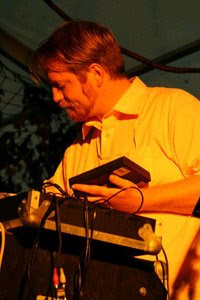Here's another short article I wrote for a project at university, this time an interview with Pixelh8. Check out the interview with Year 200X if you missed it.
Although Matthew Applegate is a classically trained musician, he is perhaps best known as Pixelh8, the groundbreaking chiptune artist. Bringing many technical innovations to the VGIM community, Pixelh8 has also made efforts to bring chiptunes to a wider audience, touring with popular British singer Imogen Heap and performing for Huw Stevens on Radio 1 (UK).
Describing how it all began: “When PCs came into the home I didn't like their samples and I just wanted to go back” Pixelh8 explains. “I loved the old tracker programs like Octamed and ProTracker, and eventually with things like emulation and homebrew development, people were able to program for these old machines like the Game Boy, and make music on them.”
Pixelh8 utilises various old games consoles and childrens' toys to create his music both live and in the studio, including the Game Boy, NES, Sega Game Gear, ZX Spectrum, Commodore 64 and Acorn Electron. “It varies from show to show, depending on whether or not I think I will be able to get my modified computers through that country's security” says Pixelh8. “Most of my computers have wires sticking out of them here and there, so they look quite dangerous. I had to set up my equipment in an airport in Germany [and] do a mini gig to show them what everything did before they would let me return to England.”
Whereas many chiptune artists write music with more user-friendly software and interfaces, Pixelh8 is well known for his raw programming skills.
“My last album took about a year to program, lots of study” he says. “I wanted to control every sound and thats something you just couldnt do unless you programmed it.”
Pixelh8 has even written his own music software for the Game Boy and Nintendo DS, with a similar program currently in production for the ZX Spectrum.
Pixelh8 admits that such an approach to music can be hard work and time-consuming, but it does have its benefits: “If you can find an old computer like the Russian made computer, the Electronika 60 or BI-201, chances are not many other people have used it for making music on, or at least not recently, so you'll have a individual sound”.
But Pixelh8's musical inspirations are not limited to the world of computers. “I want my music to sound human” he says. “Musically I am inspired by people like Sly & The Family Stone and Curtis Mayfield, so the rhythms aren't perfect, they are brilliant and human.”
Talking about the recent surge in popularity of chiptune and VGIM, Pixelh8 reckons: “In England there is a lot of nostalgia about the 80s so that might be one reason for it”. He adds, “For me chiptune music is quite [a] cathartic process, it helps me deal with a wasted youth in front of a computer screen.”

